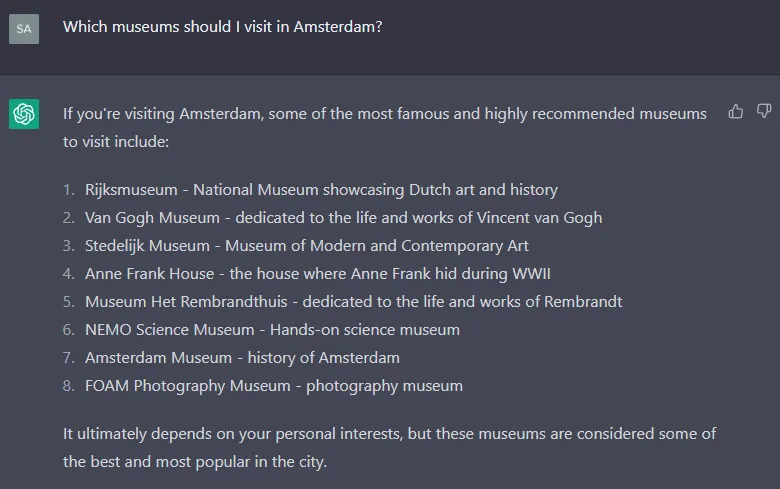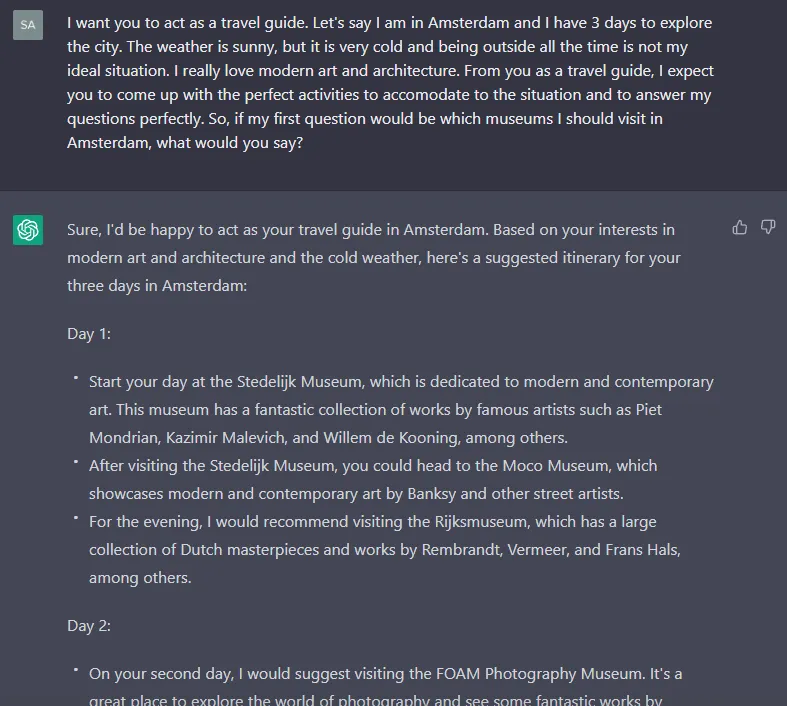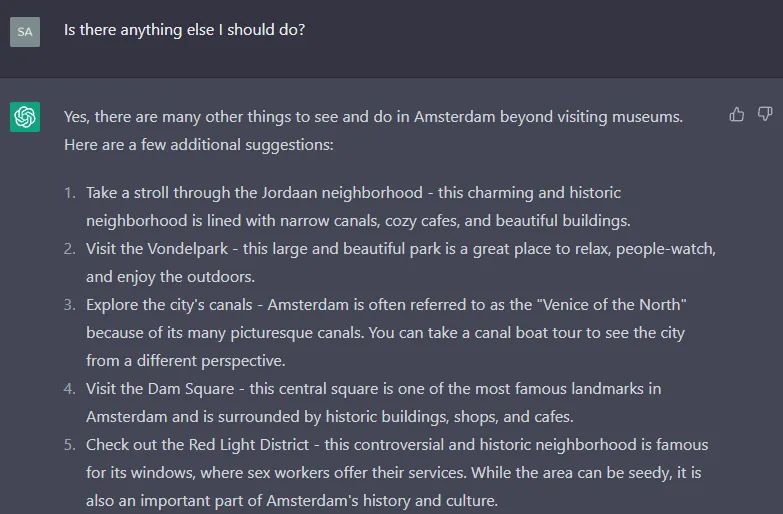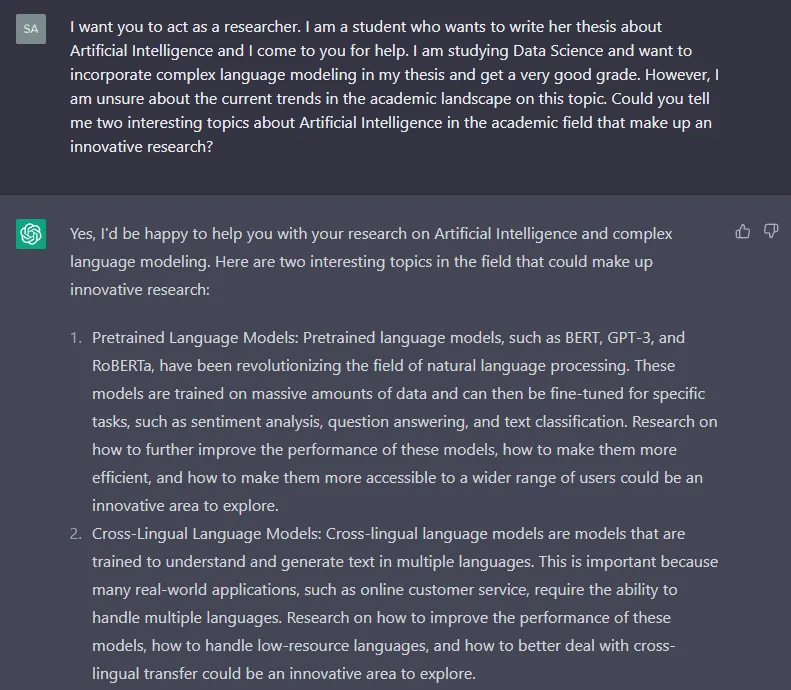On November 30, 2022, ChatGPT was launched by OpenAI. What is ChatGPT exactly? ChatGPT is a language model that uses huge amounts of data to reach its conclusions. Simply said, this technology indexes words, phrases, and sentences through statistics, reinforcement learning, and supervised learning. It doesn’t have intelligence like real human brains do, meaning it doesn’t know what a word means. However, ChatGPT knows how a word is used and is incredibly proficient at answering queries, summarizing data, and writing articles.
ChatGPT in the academic world
You can ask ChatGPT about anything, including questions about your essays, thesis and even empirical research projects. At the moment, the use of ChatGPT for these purposes is heavily discussed. ChatGPT has become such a good tool that it can even pass the final exam for an MBA program. Many people are against the use of ChatGPT, as students can write essays or complete exams without thinking about and engaging with the material.
However, the use of ChatGPT provides many benefits and opportunities as well. ChatGPT is a great tool to gather inspiration for your research project. When you struggle with finding a great title for your research, you can ask ChatGPT. You can even ask it to gather inspiration for your research. For example, you can ask which analyses would be suitable for a certain research. Or even simple questions such as ‘What questions should I ask myself when researching [your research subject]?’or ‘’Give me 10 ideas for research about music economics’ can help you along.
Furthermore, when you run into issues with your code, it can provide you with coding advice, snippets and ideas in basically every coding language. When you get stuck in your code, sometimes you simply do not know what to look for online or what your exact problem is. ChatGPT can help you come up with innovative, creative solutions you might have never found if you did the research yourself. Although these coding snippets are not fault-proof, they provide a direction for you to think in. In that way, you can improve your code and your research project.
Last, when you are obligated to a certain word limit, which is often the case when writing a thesis, you can even use ChatGPT to shorten your text! When you are bound to a character limit on social media platforms, such as Twitter, this is also a nice functionality.
It is important to mention that you should not take everything that ChatGPT produces as a fact. You can never be sure that it is fully correct, or that the code will run immediately. However, it is a great tool to broaden your possibilities when executing a research project and to become inspired to greater creativity.
Tips to efficiently use ChatGPT
First, it is important to feed the chat bot the right information in the right way. The better you are at feeding the information, the higher value you receive in return. To efficiently use ChatGPT for your research projects, it is important to think of ChatGPT as a newborn baby: it does not know anything. It has no context whatsoever for anything you want it to produce. To explain this idea, we will be asking ChatGPT for a travel itinerary in Amsterdam. We want to visit the city for a few days and need some suggestions. Let’s say you want to visit museums. ‘What are museums to visit in Amsterdam’ will generate a very basic list.

However, if your goal is that ChatGPT will serve as a travel guide, you have to lay out the situation for ChatGPT. Be as clear and precise as you can be and add as many details if you can. This will allow ChatGPT to answer your question with much more detail and much more tailored to your specific situation.

See, it really generates a way better answer! If you really need more, just ask “Is there anything else I should do?”. It’s that simple!

So, for your research project, it is important that you tell ChatGPT which role you would like it to fulfill. Furthermore, thoroughly outline your research question and/or the problem you are running into. Last, you should ask a detailed question, so that ChatGPT knows exactly what to do.
Right now, we’ve asked ChatGPT some simple questions about Amsterdam from a travel point of view. However, the same principle works for all kinds of research questions. The possibilities are endless! For example, you can help gain inspiration for your thesis topic!

Use cases of ChatGPT in economic research
This working paper by Anton Korinek (2023) is definitely worth checking out. The paper explores the potential of large language models like ChatGPT in economic research. It describes 25 use cases of how these models can be used as research assistants and tutors, covering six dimensions: ideation, writing, background research, data analysis, coding, and mathematical derivations. For each dimension, the paper provides general instructions and specific examples of tasks that can be automated using LLMs.
Useful videos to watch when using ChatGPT for your research project
ChatGPT for Scientific Research: How to use AI as a Partner in Your Research
Can ChatGPT Write Your Next Scientific Paper?
ChatGPT Guide: 10x Your Results with Better Prompts




